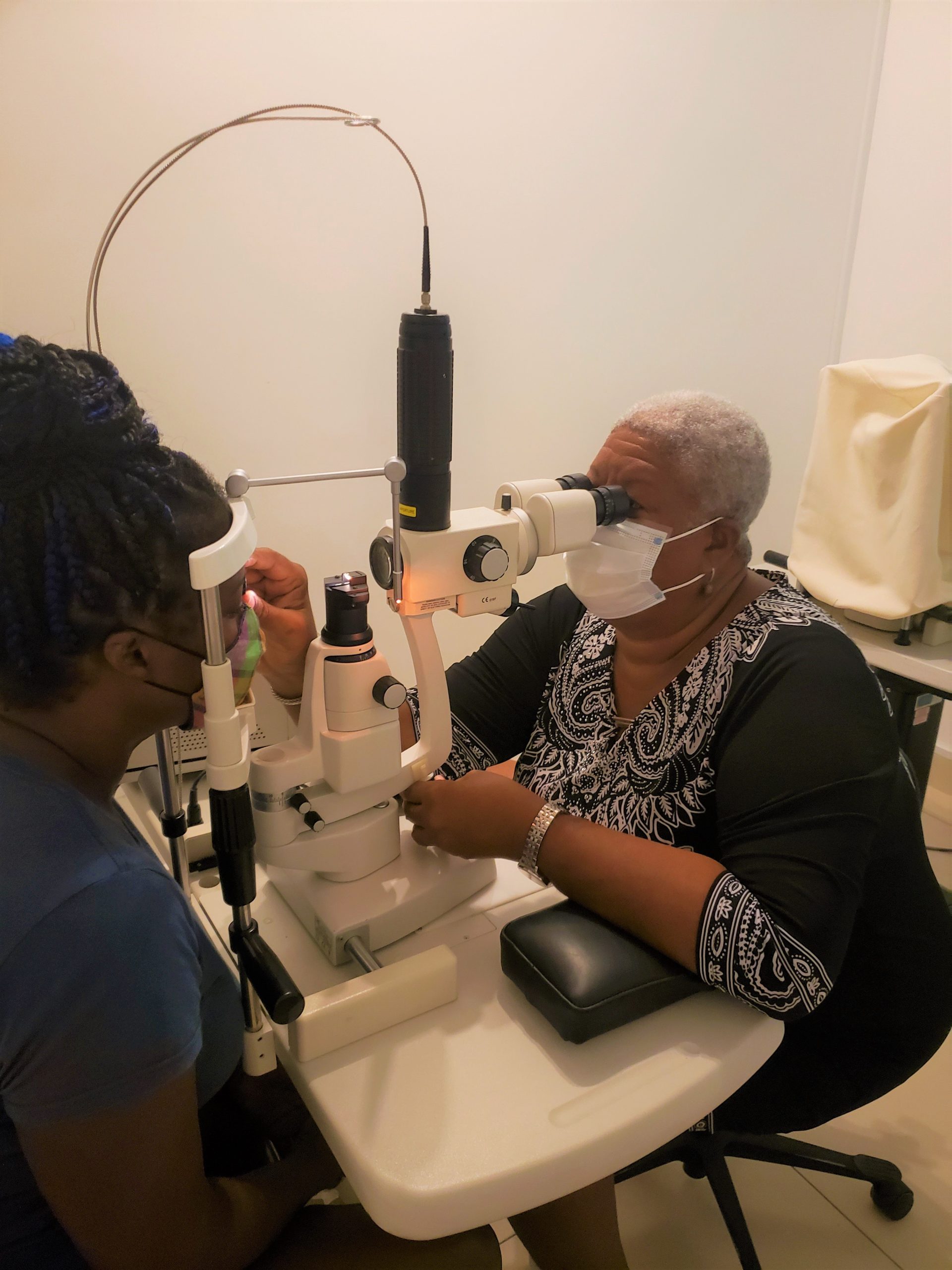The first patient being treated for diabetic retinopathy using the donated laser machine. Image: Hazel Shillingford Ricketts
Laser treatment for diabetic retinopathy, a deteriorating eye condition caused by diabetes, has long been the standard of care in higher income countries. It’s therefore especially needed in areas with a high incidence of diabetes, such as the Caribbean island of Dominica. In summer 2021 the only laser in Dominica broke down. Thanks to the tireless work of local ophthalmologist Hazel Shillingford Ricketts Dominica already has an effective national screening and treatment service for diabetic retinopathy, however without the laser the community was faced with the prospect of worsening outcomes and increased blindness.
Initially the broken laser unit was sent to Miami for repair. However, the machine had suffered catastrophic failure and needed to be replaced. With no funding in the budget, the only option to continue treatment services on the island was to try and find a donation.
Fortunately, Shillingford Ricketts and her team are part of ICEH’s Diabetic Retinopathy Network (DR-NET), run by the VISION 2020 LINKS team. The DR-NET team put Hazel’s group in touch with Dr Neil Finer, an ophthalmologist at The Royal London Hospital, who had recently contacted ICEH to offer a spare argon laser for donation.
“Our old single-spot argon laser was still working beautifully when we acquired our new state-of-the-art laser machine, and we were convinced someone could put it to good use, rather than it going to auction for parts.” Dr Finer explained.
The donation was perfectly timed to meet the need in Dominica. However, shipping the laser was still an expensive task, also beyond the local team’s current funding. The problem was resolved through the help of ophthalmic instrument manufacturer Keeler, who kindly took delivery of the laser in the UK, packaged it up and arranged shipping.
The remaining step was the re-assembly of the laser in Dominica. This was managed virtually by local biotechnician Robin Williams under the WhatsApp video guidance of Jennifer Lee and her team from Lightmed Corporation in California.
Ms Shillingford-Ricketts welcomed the new equipment: “We value the partnership developed over the years with the VISION 2020 LINKS Programme and the DR-NET, which began through Queen Elizabeth Diamond Jubilee Trust support for our National Diabetic Retinopathy Screening and Treatment Programme (NDRSTP). On behalf of the people of Dominica, the staff of the ophthalmology department at the Dominica China Friendship Hospital and the Management Advisory Committee of the NDRSTP, I take this opportunity to thank you all for collaborating in getting this laser unit to Dominica.”
The DR-NET team was thrilled at this successful international collaboration to provide, transport and get the laser working in its new location, and are asking for any further equipment donations.
“It was devastating to hear that no patients could be treated for DR in Dominica,” said research fellow Cova Bascaran. “So many people worked together to ensure the successful delivery of the donated laser to Dominica. To see it working on patients is a wonderful outcome. If anyone has a laser or camera that they are no longer using, please let us know. We have 29 partners in DR-NET in low-income countries around the world who would be very happy to receive it”.
Dr Finer continued: “We were delighted to be able to offer our machine to colleagues in Dominica. Our clinical engineering and physics team supported the plan, and the collaboration with Lightmed, Keeler and VISION 2020 LINKS was awe-inspiring. It is an unbelievable feeling to know that the laser is providing sight-saving treatment again. We’d encourage all eye units updating their equipment to consider whether it can benefit patients overseas. The VISION 2020 LINKS team can help with this.”
If you have any spare equipment for donation please contact covadonga.bascaran@lshtm.ac.uk
The VISION 2020 LINKS and DR-NET team rely on donations and grants to enable their training and capacity-building programmes to continue – please help with financial support as well as gifts of high-quality equipment that will provide years of valuable service in low-income countries.
For more information please contact iceh@lsthm.ac.uk

